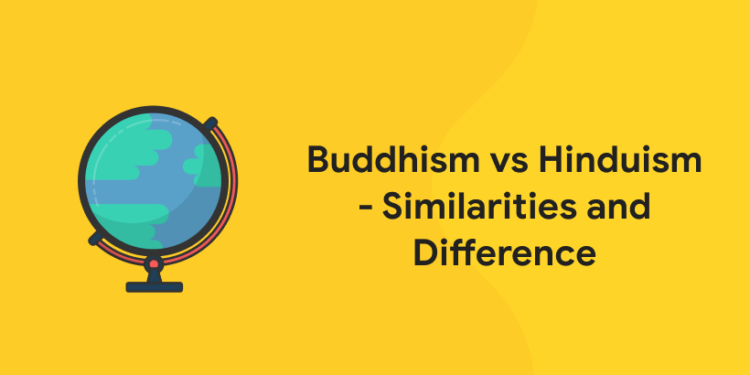Table of Contents
Buddhism and Hinduism both have their origins in India and Lord Buddha, the prophet of Buddhism, hailed from a Hindu family. Hindus worship several gods and goddesses. While Buddha did not deny the existence of any god, he preached that it is futile to search or seek something which an individual is not even aware of.
In this article we will discuss the differences and similarities between Buddhism and Hinduism to keep a deep knowledge. Aspirants preparing for various competitive exams would find this article very helpful while their preparation.
Hinduism is about understanding Brahma, existence, from within the Atman, which roughly means “self” or “soul,” whereas Buddhism is about finding the Anatman — “not soul” or “not self.” In Hinduism, attaining the highest life is a process of removing the bodily distractions from life, allowing one to eventually understand the Brahma nature within. In Buddhism, one follows a disciplined life to move through and understand that nothing in oneself is “me,” such that one dispels the very illusion of existence. In so doing, one realizes Nirvana.
| Hinduism | Buddhism |
| Origin in India | Origin in India |
| Followers of Hinduism are known as Hindus | Followers of Buddhism are known as Buddhists |
| concepts of Hinduism is samsara, karma, and dharma | concepts of Buddhism is samsara, karma, and dharma |
| The places of worship of Hindus are known as Temples. | The places of worship of Buddhists are known as Buddhist monasteries, shrines, temples |
| Recognizes many gods | Recognizes the existence of one god but does not focus on it |
| Not founded by a single person | Founded by Gautama Buddha |
| Traditionally divides society with a caste system | Recognizes that all humans are equal |
| Followers are mainly in India | Followers are mainly in East and Southeast Asia |
| Focuses on religious rituals | Focuses on ethical behaviors |
| In Hinduism, Vedas are considered as very important. | Vedas were rejected by Buddha as per the dialogues given in Nikayas. |
| he Goal of Hinduism is freedom from the cycle of birth and rebirth | The Goal of Buddhism is to bring lasting, unconditional happiness. |
Attempt free GK mock tests! Download Entri App!
Similarities Between Hinduism and Buddhism
Similar in Concepts
- In both religions, concepts are the same such as samsara (the cycle of rebirth), karma (cause and effect), or dharma (moral order).
- Samsara refers to the endless cycle of birth and death. Both Hinduism and Buddhism see life as a cycle, which means that spirits are continually reincarnated into a new life after the end of their previous one.
- Karma is the concept that any action or thought will directly result in a fitting consequence in the present or future life state. To put it plainly, if someone does bad things in this life, that person might be reborn in a less desirable state in the next life. Similarly, when good things happen to someone, karma states that it may be due to good deeds in a past life.
- Dharma is a difficult word to translate and it vaguely means natural law, duty, moral order, right conduct, or role in the universe. This concept is central to both Hinduism and Buddhism, but the interpretations in the two religions are different. In Hinduism, it is tied closely with the duty of a person, or how a person is supposed to conduct oneself according to their caste. In Buddhism, it often refers to the teachings of Buddha.
Similar in Symbolism
- Apart from similar concepts, there are similar symbols that occur in both Hinduism and Buddhism, including mudra and dharma chakra.
- Mudra is a system of symbolic hand gestures with meanings, often used during meditation. Mudra is commonly practiced in both Hinduism and Buddhism but the positions, meanings, and uses are different.
- Dharma chakra is a symbol common to Hinduism and Buddhism that looks like a ship’s steering wheel. Dharma chakra commonly appears on Hindu temple walls as well, particularly in temples of the sun god, Surya.
Similar in Practices
- Hindus and Buddhists share a few common practices such as meditation and the use of mantras.
- Hindus use mantras during rituals while worshiping gods. They also use it while praying. In Buddhism, mantra is more used as a meditation exercise to help the mind focus on certain things and let go of attachments.
- Another shared practice between Hinduism and Buddhism is meditation. But again, the two religions have different perspectives on how to go about it and why you should practice it.
Differences between Hinduism and Buddhism
Different in Perspective on God
- There are many gods in Hinduism, they are believed to all come from Brahman, the universal soul.
- Buddhists deny the existence of many gods. Instead, they believe in the existence of one god, but they do not believe it is necessary to seek god.
- Worshiping various different gods is very deeply ingrained in Hindu culture, but in Buddhism, followers are instead encouraged to focus more on self-discipline.
Different in Morality
- Hinduism’s view on morality goes hand in hand with their view of dharma.
- One of the most important teachings of Buddhism is the Eightfold Path. The eight practices are right view, right resolve, right speech, right conduct, right livelihood, right effort, right mindfulness, and right samadhi
Different Views on Buddha
- Gautama Buddha, the founder of Buddhism, is a historical figure who was born a prince of India and lived in the 4th century BC.
- Some denominations of Hinduism also recognized the figure of Buddha, but they perceive him as the 9th avatar of the god Vishnu, one of the three most important gods in Hinduism.
Different Distribution “Homelands” for Hindus and Buddhists
- Buddhism and Hinduism are the third and fourth-largest religions in the world after Christianity and Islam. In fact, 15% of the world’s population is Hindu and 7% is Buddhist.
- Hinduism is mainly focused in India. 92% of all Hindus come from India, which makes it an ethnic religion.
- Buddhism originated in northern India, but it is a religion that is distributed more widely. China has 18% of the world’s Buddhists, the largest percentage.
Different Function of Temples
- The differences in functions between Hinduism and Buddhism can be found mainly in their temples.
- Hindu temples are architecturally dedicated to the worship of a certain god: Lord Shiva, Brahma, Vishnu, Ganesh, or Lakshmi, etc., while Buddhist temples or stupas are used to honor (incarnations of) Buddha and for meditation.
Different Views on the Caste System
- The caste system benefits the upper castes but suppresses the lower castes. In fact, Hindus have to be of the Brahmin caste in order to achieve moksha, or enlightenment. The lowest caste, which is known as the untouchables, gets the worst end of it.
- Disapproval of the caste system was one of the things that triggered some of Gautama Buddha’s teachings. Instead of dividing the society into hierarchical categories, he taught that all people are of equal value, therefore there is no caste system recognized in Buddhism.
Different in Religious Festivals
- The main festivals for Hindus include Diwali, Holi, Onam, Maha Shivaratri, and Ganesh Chaturthi. All festivals in Hinduism are predominantly worshipful in character and significance.
- Festivals are also an important aspect of Buddhist practice. At festivals, Buddhist will go to the local temple or monastery and offer food to the monks, honor Buddha, concentrate on the Five Precepts, listen to a Dharma talk or chant of the Buddha’s teachings, and meditate.
Attempt free GK mock tests! Download Entri App!
Conclusion
- Hinduism is based on the concept of atman and Brahman whereas Buddhism denies the existence of an eternal soul.
- Buddhism emphasizes on sufferings in the existing world whereas Hindus believe that one can enjoy divine bliss through moksha or reunion with God
- Buddhism believes in attaining nirvana through the four noble truths and eightfold path whereas Hinduism believes there are several ways one can reach God.
- Hinduism believes in the existence of several gods whereas Buddhism reasons as to why one should seek a God which nobody is aware of.














